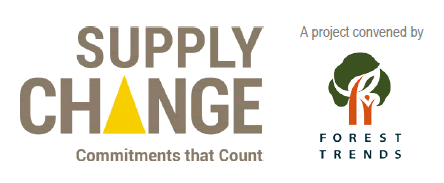Media Contact
Steve Zwick Managing Editor
Ecosystem Marketplace
+1 (312) 235-2209
[email protected]

PRESS RELASE: EMBARGOED UNTIL MARCH 25, 2015 – 11 am EST
March 25, 2015 | Washington, D.C. | The earth loses more than 6 million hectares of tropical rainforest – an area the size of Sri Lanka – every year, and two-thirds of it goes to meet demand for palm oil, soybeans, beef, and wood products, according to environmental NGO Forest Trends. At the same time, new Forest Trends research finds that companies worth nearly US$4 trillion have promised to reverse their role in degrading the world’s critical ecosystems. At least one-third of these new pledges were made in 2014, nearly doubling 2013’s announcements.
These private sector actions are encouraging, but how realistic are the promises? How many of these promises are being kept? What challenges are businesses encountering?
To answer that, Forest Trends’ new platform Supply-Change.org lets users track the actions that companies are reporting against the promises they’ve made – in near – real time. Initial findings are summarized in “Supply Change: Corporations, Commodities, and Commitments that Count”, an easy-to-read, 32-page report based on the project’s current inventory of over 300 unique commitments – about one-third of which are targeted for achievement this year – from almost as many companies.
Mining Supply-Change.Org’s growing dataset, the report finds that well over half of forest-risk commodity commitments are tracked from companies in the food and beverage industry. The data also shows that corporate leadership has a multiplier effect: one commitment from a major retailer (think Walmart or Marks and Spencer) spurs another three commitments from their suppliers upstream.
The project, launched by the Forest Trends initiative Ecosystem Marketplace in collaboration with the World Wildlife Fund (WWF) and CDP (formerly the Carbon Disclosure Project), combines Forest Trends’ environmental markets expertise with WWF’s experience in supply-chain sustainability and CDP’s global collection of corporate environmental data.
“Transparency through public disclosure is a valuable tool for the world to gauge the corporate community’s progress in eradicating deforestation from key agricultural inputs,” says Michael Jenkins, Forest Trends Founding President and CEO. “These new relationships that underlie Supply Change harness the strength of our complementary skills to provide investors and other decision-makers with free access to information that will accelerate the transition to a zero-deforestation economy.”
“We are seeing increasing awareness of the impact on businesses of deforestation risk and recently a growing trend for commitments to combat this. We are delighted that this new initiative further underlines the need for consistent corporate disclosure to CDP on the impacts of deforestation,” says CDP’s chief executive officer Paul Simpson.
“We believe that consumers should only have sustainable choices. To accomplish this, we need to completely rethink the way products are made, from the bottom up,” says Jason Clay, senior vice president of markets at WWF. “Corporate supply chain commitments send an unmistakable signal: ‘If you want to work with our company, the environment must be top-of-mind.’ Large corporations have the greatest leverage to shift whole industries, which is why supply chain commitments are so critical to our evolution to a market place full of sustainable choices.”
The Supply Change web platform (www.supply-change.org), including pilot company profiles and an initial findings report – Supply Change: Corporations, Commodities, and Commitments that Count – will be publicly launched on March 25, 2015. Supply Change is powered by CDP and WWF data and insights; and financially supported by the Climate and Land Use Alliance (CLUA), Earth Innovation Institute, Global Environment Facility, JPMorgan Chase & Co., the Norwegian Agency for Development Cooperation, and the World Bank’s Program on Forests.
###
ABOUT
 Forest Trends
Forest Trends
www.forest-trends.org
Forest Trends is a Washington, DC-based international non-profit organization whose mission is to maintain, restore, and enhance forests and connected natural ecosystems, which provide life-sustaining processes, by promoting incentives stemming from a broad range of ecosystem services and products. Specifically, Forest Trends seeks to catalyze the development of integrated carbon, water, and biodiversity incentives that deliver real conservation outcomes and benefits to local communities and other stewards of our natural resources. Forest Trends analyzes strategic market and policy issues, catalyzes connections between producers, communities and investors, and develops new financial tools to help markets work for conservation and people.
 Ecosystem Marketplace
Ecosystem Marketplace
www.ecosystemmarketplace.com“>ecosystemmarketplace.com
Ecosystem Marketplace, an initiative of Forest Trends, is a leading source of news, data, and analytics on markets and payments for ecosystem services such as water quality, carbon sequestration, and biodiversity. Ecosystem Marketplace works through a range of qualitative and quantitative analyses to link practitioners and decision-makers with each other and advises companies, governments and other NGOs on carbon/forest carbon market developments, transparency, social and environmental co-benefits and other mechanisms.
 CDP
CDP
https://www.cdp.net/en”>cdp.net
CDP is an international NGO that provides the only global system through which more than 5,000 companies from more than 85 countries and 207 cities report, manage and share vital environmental information. CDP now holds the largest collection globally of primary corporate environmental information and puts these insights at the heart of strategic business, investment and policy decisions. Please visit www.cdp.net or follow us @CDP to find out more.
![]() World Wildlife Fund
World Wildlife Fund
www.worldwildlife.org
WWF is one of the world’s leading conservation organizations, working in 100 countries for over half a century. With the support of almost 5 million members worldwide, WWF is dedicated to delivering science-based solutions to preserve the diversity and abundance of life on Earth, halt the degradation of the environment and combat climate change.
